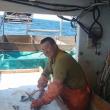Fishermen providing local seafood to Maine students
Maine students have been able to eat and cook locally caught seafood because of Maine Coast Fishermen’s Association’s (MCFA) program, Fishermen Feedings Mainers. MCFA, a nonprofit whose mission is to restore the fisheries in the GOM and sustain Maine's fishing communities for future generations, started the Fishermen Feeding Mainers during the pandemic when fishermen were having a hard time finding markets for their catch. Many Mainers were also struggling to provide enough food for their families. These two needs sparked an idea to purchase seafood from Maine’s small-boat fishermen and donate it to those facing food insecurity.
To date, the Fishermen Feeding Mainers program has provided over 200,000 meals with the help of several grants from family foundations, funding from the Governor’s office and support from donors in the community.
“At the beginning, there was a bit of a learning curve,” says program manager Mary Hudson. “When we offered a variety of species, the more familiar ones like pollock and white hake were chosen more often. But, recently, we received a surge in the number of monkfish orders from schools and child care facilities.”
Monkfish is a delicious, meaty fish, but it isn’t particularly pretty. From above it is brown and mottled and blends with the seafloor where it lives. But, underneath, it has a giant wide mouth that comprises most of its flat body - and lots and lots of teeth. It isn’t the easiest to handle in its whole form, but when processed, the tail yields a substantial amount of meat. In fact, as compared to a pollock which has a filet that accounts for about 50% of its body, you can get about a 65-70% yield from a monkfish. This helps provide more nutrition to more people. MCFA has partnered with local processors to provide easy-to-use products to the chefs at the schools and food banks they work with.
Including monkfish in this program not only provides more nutritious meals, but it also helps to bring a higher profit to the fishermen since more of each fish is utilized. In addition, MCFA is able to offer a stable and regular price to fishermen for their product. This means that rather than landing catch that they may not be able to sell, fishermen have an already established market.
The program continues to grow and garner new interest from those involved. Several area vocational schools with culinary arts programs have been experimenting with a variety of cooking techniques. In fact, one school group won a cooking competition for their development of a recipe using pollack they received through the program.These students are developing skills in seafood preparation that they can bring into Maine restaurants and food services in the future. The teachers have gotten more engaged as well. In fact, Mike Flynn, Nutritional Director at RSU12, wanted to learn more about how the fish he was using in his kitchens were caught. He spent a two-day trip aboard a groundfishing boat out of Portland with Brian Pearce, captain of F/V Gracelyn Jane. “I'm always seeking to get the best ingredients for our students; it was amazing to see how these ingredients are harvested and experience the hard work and care that goes into handling the fish and producing a quality product," Flynn said following his trip.
The goal for this program is that it can grow to include more species and more recipients to both support the fishermen and help address area hunger. It also offers an opportunity going forward for Mainers to learn more about the variety of local seafood available to them and how to prepare it in delicious ways.
Event Date
Address
United States
























